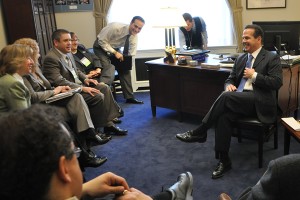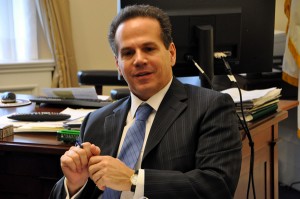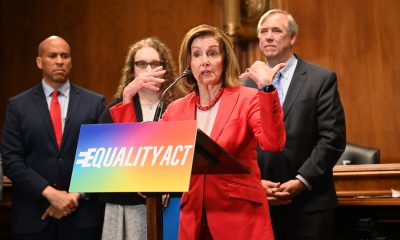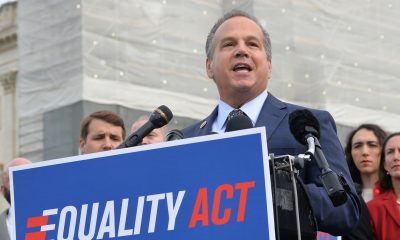National
Adjusting to freshman life on the Hill
Gay Rep. Cicilline on being in the minority, the prospects for a pro-LGBT omnibus bill — and D.C.’s social scene

As Rep. David Cicilline (D-R.I.) and his fellow House Democrats are discovering, being in the minority is rough.
The freshman lawmaker — and fourth sitting openly gay member of Congress — offers help to the best of his abilities to a group of disability advocates from his district, but knows his influence is limited with U.S. House Speaker John Boehner (R-Ohio) running the chamber and pledging to slash billions from government programs.
The Blade spent a day shadowing Cicilline last week. Six weeks into his first term as a member of Congress, he meets with about a dozen constituents working on disability issues in his office at the Cannon Office Building.
The meeting is one of four today for the Providence, R.I., mayor-turned-member of Congress, which is a typical load for Cicilline. Among his planned meetings is a talk with gay Rhode Island State House Speaker Gordon Fox, a leader in the fight to legalize same-sex marriage in the Ocean State.
But for this meeting, Cicilline listens intently as the advocates voice their concerns and hand him data sheets on problems facing the disabled and potential cuts to government programs.
Donna Martin, executive director of Rhode Island’s Community Provider Network, asks the lawmaker to push for continued funding for Medicaid programs through appropriations to the Department of Health & Human Services.
“The FMAP, the federal Medicaid match, the increased FMAP percentage is due to expire at the end of June,” she says. “That is going to have a tremendous impact on Rhode Island, specifically on our services. We are asking for consideration that those funds be extended until [health care reform] can be implemented — a provision in [health care reform] that expands the Medicaid safety net, if you will, which is active in 2014.”
Martin acknowledges that the Republican-controlled House doesn’t have “a whole lot of appetite” for talking about the extension of Medicaid funds, but emphasizes the importance of the program.
“It is a piece that has managed to keep many of these organizations afloat,” she says.
The disruptive noise of a loud conversation is heard from an adjoining room. Ever the attentive host, Cicilline rises from his seat to shut the door to his office.
Meanwhile, Jack Padien, CEO of Arc of Blackstone Valley, discusses the need for continued funds for the Department of Housing & Urban Development and Section 811 programs, which provide housing for low-income people with disabilities.
“The concern is, and I’m sure the concern with you and everyone else on the Democratic side, is that the Republicans have just put in a $63 billion cut — proposed cut — and that takes out a lot of things,” he says. “It would be devastating to take out $250 million out of a $300 million budget for low-income housing.”
Clad in a pinstripe suit, French cuffs and Italian loafers, Cicilline articulates his response in his distinctively raspy voice, starting with a comparison of President Obama’s fiscal year 2012 budget request to what the Republicans are proposing.
“If you look at the president’s budget — I mean, there are many things in that budget that I don’t agree with,” he says. “There’s some cuts in programs that I know are good programs, but the distance between the president’s budget and what the Republicans are proposing are just night and day.”
Cicilline cites figures that the Republican proposal would cost 80,000 jobs and, by comparison, says the president’s budget would be effective in reducing the deficit and spending while providing funds for infrastructure and education.
“It’s what families would use by tightening the belt by taking out the things that aren’t working and you don’t need, but also continue to invest in things that your family needs for its future security,” Cicilline says.
The freshman pledges to work hard to pass the president’s agenda in the House, but says he suspects Democrats won’t be able to accomplish that while being in the minority.
“It’s going to depend a lot on the role the Senate plays and how we stop some of this because I think the House Republicans are going to pass something, which, I think, everybody in this room would find really unacceptable,” he says.
As a final request, Cicilline asks for specific examples of how cuts proposed by Republicans would cost jobs or harm programs that rely on federal programs.
“We talk about it in public hearings — $2 billion we cut here or $5 billion here,” Cicilline says. “That much money? It should get cut. And I think to the extent that you can provide me, ‘Look if this program is cut in half, 25 less people will be enrolled in this service and we’ll have to close that,’ that would be very useful both in terms of making the case to other colleagues and also just describing to people back home what the consequences of the Republican budget would mean.”
The meeting concludes with a group photo of Cicilline and the Rhode Island constituents who sat in on the meeting. Staffer Brad Greenburg is poised to take the photo, although Cicilline has to remind him to remove the cap from the lens before hitting the flash button.
The theme of Republicans working to slash funds from programs while Democrats urge for continued appropriations is a common one lately.
On Tuesday, as the House debates a resolution to continue funds for the remainder of the fiscal year, Cicilline takes to the floor to denounce cuts Republicans are proposing.
“The Republicans are moving forward with a dangerous spending bill, one that continues to give rewards to the rich and literally guts the initiatives most meaningful to middle class families,” Cicilline says. “Simply put, the Republicans’ spending bill is irresponsible and tone deaf to the needs of a healing nation.”
Cicilline says the Republican spending proposal would cut Pell Grants by $800 per student and kick more than 200,000 children out of Head Start. Additionally, he says the measure would undermine domestic security by eliminating 1,330 police officers and 2,400 firefighters throughout the country.
“The work of reducing our deficit and controlling spending will be hard, to be sure,” Cicilline says. “The fact of the matter is that we have to cut spending. But we have to do it responsibly. We cannot cut what makes us competitive and what helps us to innovate, to succeed in the global economy, and ultimately to create jobs.”
But in the end, the Republicans have their way on the continuing resolution. On Saturday, the House passes a measure with $61 billion in cuts from last year’s spending levels by a vote of 235-189.
The legislation now heads to the Democratic-controlled Senate, and a failure of both chambers to reach an agreement by March 4 could result in the shutdown of the U.S. government.
Following the vote, Boehner commends the House for passing the continuing resolution with reduced spending, noting, “the House works best when it is allowed to work its will.”
“This week, for the first time in many years, the People’s House was allowed to work its will — and the result was one of the largest spending cuts in American history,” Boehner says in a statement. “We will not stop here in our efforts to cut spending, not when we’re broke and Washington’s spending binge is making it harder to create jobs.”
Learning the ropes
After his constituents leave his office, Cicilline removes his jacket and retires behind his desk as he prepares for his interview with this reporter.
Papers and folders are neatly piled in different stacks. Also on his desk is a copy of “The American Way to Change” by Shirley Sagawa and “George Washington’s Sacred Fire,” a biography on the first president by Peter Lilback.
 Adorning his wall is a large green abstract painting by Tom Sgorous, a Rhode Island artist. On a nearby table, a glass bowl is displayed with the inscription, “Italio-American Club Man of the Year 2003 — Mayor David Cicilline.”
Adorning his wall is a large green abstract painting by Tom Sgorous, a Rhode Island artist. On a nearby table, a glass bowl is displayed with the inscription, “Italio-American Club Man of the Year 2003 — Mayor David Cicilline.”
During his six weeks in office, Cicilline has been busy hiring staff and setting up offices both in D.C. and in Rhode Island’s 1st congressional district. He’s also been serving on the policy steering committee to set the House Democratic agenda for the 112th Congress.
“I’ve been really learning how Congress operates and how I can have the greatest impact as a new member and as a freshman in the minority,” Cicilline says.
He made the trip from Rhode Island to D.C. solo. Asked whether he has a partner, he says he’s single.
“You’re asking me that right after Valentine’s Day?” he jokes. “How cruel!”
Still, Cicilline says he’s already visited at least one local gay bar since arriving in the District, although he can’t immediately recall the name of the establishment he visited last week.
When asked if it could have been Cobalt, Nellie’s or JR.’s, he quickly interrupts. “JR.’s,” Cicilline exclaims as he snaps his fingers. “It was just like a bar, bar. I met a friend from Rhode Island for a drink who works here in Washington.”
But focusing on the business before him on Capitol Hill, Cicilline says his top legislative priority is passage of what he calls the “Made in America” block grant.
As he envisions it, the legislation would encourage companies to keep manufacturing jobs in the United States by providing $2 billion in funds to retrofit factories, retrain workers and buy new equipment.
“I think one of the things that we have to do to really rebuild the economy in this country is start making things again and selling them in the global market,” he says.
Cicilline says he’s already spoken with House Minority Leader Nancy Pelosi (D-Calif.) about the “Made in America” block grant, which he says she supports.
Figuring out how to advance LGBT issues is also on the agenda. Upon his swearing in, Cicilline became a co-chair of the LGBT Equality Caucus and is learning from more senior openly gay members of Congress — Reps. Barney Frank (D-Mass.), Tammy Baldwin (D-Wisc.) and Jared Polis (D-Colo.) — about where to focus their attention.
Cicilline emphasizes that he’s new to Congress and learning about the legislative priorities for the LGBT community, but knows that with Boehner as presiding officer of the House, moving forward will be challenging to say the least.
“But this is the year when it’s going to be very, very difficult — maybe impossible — to make progress on most of our issues,” he says. “We’re going to be very defensive mostly. Protecting the progress we’ve made and try to prevent the clock from turning back with Republican leadership in the House.”
Cicilline says he isn’t sure what kind of anti-gay measures, if any, the Republicans might pass out of the House, but expresses confidence that the Democratic-controlled Senate would block any such initiatives from reaching Obama’s desk.
One item that has Cicilline’s interest is comprehensive legislation that would roll all pro-LGBT initiatives — such as the Employment Non-Discrimination Act, the Uniting American Families Act and repeal of the Defense of Marriage Act — into one piece of legislation.
“One of the things I’d like to explore is this idea of developing an omnibus bill that contains many of the specific pieces of legislation that have been on our agenda for a number of years and put them together in a comprehensive equality measure for the LGBT community,” Cicilline says. “I’d like to obviously talk to my colleagues about that as a strategy versus individual bills.”
But what to do about ENDA, one of the LGBT community’s top outstanding legislative priorities? What’s the best way to draw attention to the issue of job discrimination in the interim as Republican control of the House makes passage of the legislation unlikely for at least two years?
Cicilline notes as a legislator in the Rhode Island State House, he worked to help pass legislation that would bar discrimination in the state against LGBT people in situations of housing, credit, public accommodations and employment.
The Rhode Island lawmaker says the best way to draw attention to the lack of employment protections for LGBT people is to showcase people who’ve been wronged under current law.
“I think people are really fair-minded,” he says. “Most people if you sat them down and said, ‘Someone who’s working everyday and goes to work and is doing their job, their employer can say, ‘You want what? I’m firing you because you’re gay.”‘ Most people would say, “That’s wrong!” They would be surprised even to learn you can do that.”
Tongues are also wagging about another LGBT march on Washington in 2012 as a means to draw attention to LGBT issues and energize the Democratic base in the upcoming election. Still, Cicilline says he thinks resources could be better spent on constituents encouraging their members of Congress to support pro-LGBT initiatives.
“I guess you could get lots of people to march on Washington,” he says. “I just assume they were door-knocking for progressive candidates that support marriage equality, but if they’re willing to do both, I think it’s fine.”
Cicilline has landed choice committee assignments, including seats on the Small Business and Foreign Affairs committees. The lawmaker says he hopes his position on the panel overseeing international affairs will give more visibility to “the hideous treatment of LGBT members all over the world.”
For example, Cicilline says he hopes he can build awareness about the plight of LGBT people in Uganda, where activist David Kato was murdered in January and a bill that would institute the death penalty is pending before parliament.
“I think we need to be sure that we have hearings on the issue,” Cicilline says. “I’ll be raising awareness and using my role on the foreign affairs committee to work to develop a strong U.S. policy against that.”
Earlier in the week, Cicilline met with Frank Mugisha, an LGBT Ugandan activist and executive director of Sexual Minorities Uganda.
Another LGBT agenda item that’s important to Cicilline: the advancement of same-sex marriage. Rhode Island is among a few states seeing progress this year on relationship recognition for same-sex couples.
Cicilline says he’s “very much” glued to the legislative effort to pass marriage legislation in Rhode Island and believes “the prospects are very good this year” for enactment of such a measure.
“I think there is strong support from the House leadership and from the members,” he says. “The challenge is to make sure that it comes out of the House strongly because I think the fight is in the Senate.”
Cicilline adds that Gov. Lincoln Chafee’s (I) support for the marriage bill “is a big changer” from when former Republican Gov. Donald Carcieri, who opposes marriage rights for gay couples, was running the state.
But what about Obama’s position on same-sex marriage? The president has said his position could evolve on the issue and that he’s wrestling with the idea of same-sex marriage, but he hasn’t yet endorsed marriage rights for same-sex couples.
“I think the president is being very honest about his thinking that — and I take him at his word — that his position is evolving,” Cicilline says. “I think marriage equality is the right answer because it shows that every single American has access to this important institution.”
Cicilline dismisses the notion that Obama’s lack of support for same-sex marriage has a significant impact on legislative efforts to enact marriage rights for gay and lesbian couples in Rhode Island.
“I think legislators in Rhode Island will make up their minds on the issue of marriage equality based on their own view on it and by listening to constituents on it,” he says. “I’m not sure that the president’s position will have a direct impact on that.”
He adds that he doesn’t have any way of knowing whether Obama will come to support same-sex marriage, but has high hopes the president will come around.
“Everything that I know about him leads me to believe that he will look very strongly at equality and justice and ending discrimination of any kind,” Cicilline says. “So, I would hope that the conclusion of his thinking will also get him to where he supports marriage equality.”
With his Blade interview complete, Cicilline moves on to the rest of the day’s meetings. However, his schedule isn’t limited to private meetings with constituents.
Busy day on the Hill
Cicilline is scheduled to hear testimony in the afternoon as part of the House Small Business Committee. The title of the hearing is “Putting Americans Back to Work: The State of the Small Business Economy.”
The Republicans who control the committee — and the GOP-chosen witnesses — use the hearing to denounce the Obama administration’s policies.
House Small Business Committee Chair Sam Graves (R-Mo.) plays up the trials that small businesses face in the United States even in times when the economy is prosperous.
“Even though there has been recent signs that our economy is starting to improve, our recovery from this recession remains sporadic at best,” Graves says. “As we’ve said many time before, small businesses need certainty for plan for not only the next day but also the next month and the next year.”
Graves also takes a dig at the health care reform law passed by the 111th Congress. Repealing or defunding the initiative has been a priority of Republican leadership in the current Congress.
“After the new health care law passed last year, I heard from countless small businesses in my district and right here in this committee room that not only will this new law fail to provide health care benefits to employees, but the costs will put them out of business,” Graves said.
The Republican-appointed witnesses offer testimony bemoaning practices the Obama administration has put in place.
Representing the U.S. Chamber of Commerce — known for its hostility to the president — is Bill Feinberg, president of Allied Kitchen and Bath, Inc., in Fort Lauderdale, Fla., who blasts the health care reform law.
“I know that in 2014 the new employer mandate starts — the mandate says an employer with 50 or more employees must offer government-approved health insurance or pay steep fines,” he says. “Wouldn’t incentives, rather than penalties, have been a better way to send the message that government and businesses can work together?”
Dixie Kolditz, owner of Open-Box Creations in Cathlament, Wash., says regulations that the Obama administration has put in place are stifling her import business.
“We have had to be creative and make our money stretch more than it used to,” she says. “This becomes harder when there are expected and unexpected regulations and hidden government taxes and fees.”
Cicilline arrives at the committee hearing after the witnesses have given their opening statements. Taking his seat on the dais — far to the end in accordance with his freshman status — the lawmaker dons a pair of spectacles and presumably reads the written testimony submitted by witnesses.
When Graves gives Ciclline the green light to begin his questioning, he starts by expressing his interest in growing small businesses in the United States.
“I think we’re all very interested in what we need to do to make small business grow and to create more jobs,” Cicilline says. “So, I’m interested in specifics — because I understand the feeling that you may have of small business being overregulated and overburdened, but to be helpful in terms of coming to address that, I need to understand what the specifics are.”
Beginning his questioning with Feinberg, Cicilline notes the small business owner already provides health care benefits to employees, even though he is not required to do so.
“I presume you do that because you decided it’s valuable to have employees who are healthy and well and can be productive,” Cicilline says.
“My employees are my partners,” Feinberg says. “That’s what grows my business.”
Cicilline presses Feinberg on whether the entrepreneur thinks “it’s a good idea” to have a system in place that provides affordable health care to small businesses.
“I can’t say whether or not,” Feinberg says. “As a business owner, I look at what’s going to grow my business. Knowing that I have to provide insurance — that limits me. That does not give me the flexibility as a business owner that I think is required to grow my business.”
Following up, Cicilline asks whether he’s aware that he’s entitled to a tax credit in exchange for providing health insurance to at least 50 employees. Feinberg says he’s aware of the law.
“The reason I ask that is that I think it’s important that we also at the [Small Business Administration] or relevant federal agencies should share that information with small businesses,” Cicilline says. “The tax cut is designed to help small business and make providing health care affordable, so I think that’s an important responsibility.”
On his way out of the hearings, Cicilline tells the Blade he realizes the committee lineup was orchestrated to favor Republican policy.
“The witnesses are clearly invited by the majority party, so I think they have a very clear view on what they think about some of those issues that was reflected in the witnesses,” Cicilline says.
Cicilline heads back to his office, but not before a constituent approaches and asks for a picture with him. This reporter complies with a request to take a photo of the two, then watches as the Rhode Island lawmaker heads back to the Cannon House Office Building to continue his work.
Federal Government
HHS to retire 988 crisis lifeline for LGBTQ youth
Trevor Project warns the move will ‘put their lives at risk’

The U.S. Department of Health and Human Services is planning to retire the national 988 crisis lifeline for LGBTQ youth on Oct. 1, according to a preliminary budget document obtained by the Washington Post.
Introduced during the Biden-Harris administration in 2022, the hotline connects callers with counselors who are trained to work with this population, who are four times likelier to attempt suicide than their cisgender or heterosexual counterparts.
“Suicide prevention is about risk, not identity,” said Jaymes Black, CEO of the Trevor Project, which provides emergency crisis support for LGBTQ youth and has contracted with HHS to take calls routed through 988.
“Ending the 988 Suicide and Crisis Lifeline’s LGBTQ+ youth specialized services will not just strip away access from millions of LGBTQ+ kids and teens — it will put their lives at risk,” they said in a statement. “These programs were implemented to address a proven, unprecedented, and ongoing mental health crisis among our nation’s young people with strong bipartisan support in Congress and signed into law by President Trump himself.”
“I want to be clear to all LGBTQ+ young people: This news, while upsetting, is not final,” Black said. “And regardless of federal funding shifts, the Trevor Project remains available 24/7 for anyone who needs us, just as we always have.”
The service for LGBTQ youth has received 1.3 million calls, texts, or chats since its debut, with an average of 2,100 contacts per day in February.
“I worry deeply that we will see more LGBTQ young people reach a crisis state and not have anyone there to help them through that,” said Janson Wu, director of advocacy and government affairs at the Trevor Project. “I worry that LGBTQ young people will reach out to 988 and not receive a compassionate and welcoming voice on the other end — and that will only deepen their crisis.”
Under Trump’s HHS secretary, Robert F. Kennedy, Jr., the agency’s departments and divisions have experienced drastic cuts, with a planned reduction in force of 20,000 full-time employees. The Substance Abuse and Mental Health Services Administration has been sunset and mental health services consolidated into the newly formed Administration for a Healthy America.
The budget document reveals, per Mother Jones, “further sweeping cuts to HHS, including a 40 percent budget cut to the National Institutes of Health; elimination of funding for Head Start, the early childhood education program for low-income families; and a 44 percent funding cut to the Centers for Disease Control, including all the agency’s chronic disease programs.”
U.S. Supreme Court
Supreme Court hears oral arguments in LGBTQ education case
Mahmoud v. Taylor plaintiffs argue for right to opt-out of LGBTQ inclusive lessons

The U.S. Supreme Court on Tuesday heard oral arguments in Mahmoud v. Taylor, a case about whether Montgomery County, Md., public schools violated the First Amendment rights of parents by not providing them an opportunity to opt their children out of reading storybooks that were part of an LGBTQ-inclusive literacy curriculum.
The school district voted in early 2022 to allow books featuring LGBTQ characters in elementary school language arts classes. When the county announced that parents would not be able to excuse their kids from these lessons, they sued on the grounds that their freedom to exercise the teachings of their Muslim, Jewish, and Christian faiths had been infringed.
The lower federal courts declined to compel the district to temporarily provide advance notice and an opportunity to opt-out of the LGBTQ inclusive curricula, and the 4th U.S. Circuit Court of Appeals determined that the parents had not shown that exposure to the storybooks compelled them to violate their religion.
“LGBTQ+ stories matter,” Human Rights Campaign President Kelley Robinson said in a statement Tuesday. “They matter so students can see themselves and their families in the books they read — so they can know they’re not alone. And they matter for all students who need to learn about the world around them and understand that while we may all be different, we all deserve to be valued and loved.”
She added, “All students lose when we limit what they can learn, what they can read, and what their teachers can say. The Supreme Court should reject this attempt to silence our educators and ban our stories.”
GLAD Law, NCLR, Family Equality, and COLAGE submitted a 40-page amicus brief on April 9, which argued the storybooks “fit squarely” within the district’s language arts curriculum, the petitioners challenging the materials incorrectly characterized them as “specialized curriculum,” and that their request for a “mandated notice-and-opt-out requirement” threatens “to sweep far more broadly.”
Lambda Legal, the Leadership Conference on Civil and Human Rights, PFLAG, and the National Women’s Law Center announced their submission of a 31-page amicus brief in a press release on April 11.
“All students benefit from a school climate that promotes acceptance and respect,” said Karen Loewy, senior counsel and director of constitutional law practice at Lambda Legal. “Ensuring that students can see themselves in the curriculum and learn about students who are different is critical for creating a positive school environment. This is particularly crucial for LGBTQ+ students and students with LGBTQ+ family members who already face unique challenges.”
The organizations’ brief cited extensive social science research pointing to the benefits of LGBTQ-inclusive instruction like “age-appropriate storybooks featuring diverse families and identities” benefits all students regardless of their identities.
Also weighing in with amici briefs on behalf of Montgomery County Public Schools were the National Education Association, the ACLU, and the American Psychological Association.
Those writing in support of the parents challenging the district’s policy included the Center for American Liberty, the Manhattan Institute, Parents Defending Education, the Alliance Defending Freedom, the Trump-Vance administration’s U.S. Department of Justice, and a coalition of Republican members of Congress.
U.S. Supreme Court
LGBTQ groups: SCOTUS case threatens coverage of preventative services beyond PrEP
Kennedy v. Braidwood oral arguments heard Monday

Following Monday’s oral arguments before the U.S. Supreme Court in Kennedy v. Braidwood Management, Inc., LGBTQ groups issued statements warning the case could imperil coverage for a broad swath of preventative services and medications beyond PrEP, which is used to reduce the risk of transmitting HIV through sex.
Plaintiffs brought the case to challenge a requirement that insurers and group health plans cover the drug regimen, arguing that the mandate “encourage[s] homosexual behavior, intravenous drug use, and sexual activity outside of marriage between one man and one woman.”
The case has been broadened, however, such that cancer screenings, heart disease medications, medications for infants, and several other preventive care services are in jeopardy, according to a press release that GLAAD, Lambda Legal, PrEP4All, Harvard Law’s Center for Health Law and Policy Innovation (CHLPI), and the Center for HIV Law and Policy (CHLP) released on Monday.
The Trump-Vance administration has argued the independent task force responsible for recommending which preventative services must be covered with no cost-sharing for patients is constitutional because the secretary of the U.S. Department of Health and Human Services can exercise veto power and fire members of the volunteer panel of national experts in disease prevention and evidence-based medicine.
While HHS secretaries have not exercised these powers since the Affordable Care Act was passed in 2010, Braidwood could mean Trump’s health secretary, Robert F. Kennedy Jr., takes a leading role in determining which services are included in the coverage mandate.
Roll Call notes the Supreme Court case comes as the administration has suspended grants to organizations that provide care for and research HIV while the ongoing restructuring of HHS has raised questions about whether the “Ending the HIV Epidemic” begun under Trump’s first term will be continued.
“Today’s Supreme Court hearing in the Braidwood case is a pivotal moment for the health and rights of all Americans,” said GLAAD President Sarah Kate Ellis. “This case, rooted in discriminatory objections to medical necessities like PrEP, can undermine efforts to end the HIV epidemic and also jeopardize access to essential services like cancer screenings and heart disease medications, disproportionately affecting LGBTQ people and communities of color.”
She added, “Religious exemptions should not be weaponized to erode healthcare protections and restrict medically necessary, life-saving preventative healthcare for every American.”
Lambda Legal HIV Project Director Jose Abrigo said, “The Braidwood case is about whether science or politics will guide our nation’s public health policy. Allowing ideological or religious objections to override scientific consensus would set a dangerous precedent. Although this case began with an attack on PrEP coverage, a critical HIV prevention tool, it would be a serious mistake to think this only affects LGBTQ people.”
“The real target is one of the pillars of the Affordable Care Act: The preventive services protections,” Abrigo said. “That includes cancer screenings, heart disease prevention, diabetes testing, and more. If the plaintiffs succeed, the consequences will be felt across every community in this country, by anyone who relies on preventive care to stay healthy.”
He continued, “What’s at stake is whether we will uphold the promise of affordable and accessible health care for all or allow a small group of ideologues to dismantle it for everyone. We as a country are only as healthy as our neighbors and an attack on one group’s rights is an attack on all.”
PrEP4All Executive Director Jeremiah Johnson said, “We are hopeful that the justices will maintain ACA protections for PrEP and other preventive services, however, advocates are poised to fight for access no matter the outcome.”
He continued, “Implementing cost-sharing would have an enormous impact on all Americans, including LGBTQ+ individuals. Over 150 million people could suddenly find themselves having to dig deep into already strained household budgets to pay for care that they had previously received for free. Even small amounts of cost sharing lead to drops in access to preventive services.”
“For PrEP, just a $10 increase in the cost of medication doubled PrEP abandonment rates in a 2024 modeling study,” Johnson said. “Loss of PrEP access would be devastating with so much recent progress in reining in new HIV infections in the U.S. This would also be a particularly disappointing time to lose comprehensive coverage for PrEP with a once every six month injectable version set to be approved this summer.”
“Today’s oral arguments in the Braidwood case underscore what is at stake for the health and well-being of millions of Americans,” said CHLPI Clinical Fellow Anu Dairkee. “This case is not just about legal technicalities — it is about whether people across the country will continue to have access to the preventive health services they need, without cost sharing, regardless of who they are or where they come from.”
She continued, “Since the Affordable Care Act’s preventive services provision took effect in 2010, Americans have benefited from a dramatic increase in the use of services that detect disease early, promote healthy living, and reduce long-term health costs. These benefits are rooted in the work of leading scientists and public health experts, including the U.S. Preventive Services Task Force, whose recommendations are based on rigorous, peer-reviewed evidence.”
“Any shift away from cost-free access to preventive care could have wide-ranging implications, potentially limiting access for those who are already navigating economic hardship and health disparities,” Dairkee said. “If Braidwood prevails, the consequences will be felt nationwide. We risk losing access to lifesaving screenings and preventive treatments that have become standard care over the past decade.”
“This case should serve as a wake-up call: Science, not politics, must guide our health care system,” she said. “The health of our nation depends on it.”
“We are grateful for the Justices who steadfastly centered constitutionality and didn’t allow a deadly political agenda to deter them from their job at hand,” said CHLP Staff Attorney Kae Greenberg. “While we won’t know the final decision until June, what we do know now is not having access to a full range of preventative healthcare is deadly for all of us, especially those who live at the intersections of racial, gender and economic injustice.”
“We are crystal clear how the efforts to undermine the ACA, of which this is a very clear attempt, fit part and parcel into an overall agenda to rollback so much of the ways our communities access dignity and justice,” he said. “Although the plaintiffs’ arguments today were cloaked in esoteric legal language, at it’s heart, this case revolves around the Christian Right’s objection to ‘supporting’ those who they do not agree with, and is simply going to result in people dying who would otherwise have lived long lives.”
“This is why CHLP is invested and continues in advocacy with our partners, many of whom are included here,” Greenberg said.
-

 Federal Government3 days ago
Federal Government3 days agoHHS to retire 988 crisis lifeline for LGBTQ youth
-

 Opinions3 days ago
Opinions3 days agoDavid Hogg’s arrogant, self-indulgent stunt
-

 District of Columbia3 days ago
District of Columbia3 days agoD.C. police seek help in identifying suspect in anti-gay threats case
-

 Virginia3 days ago
Virginia3 days agoGay talk show host wins GOP nom for Va. lieutenant guv












